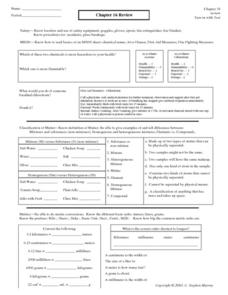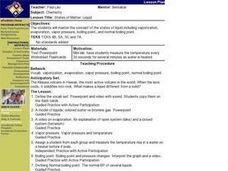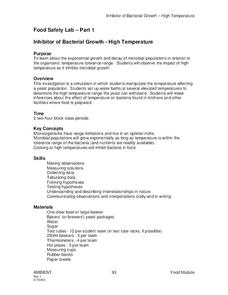Curated OER
Iron Fertilization - Pumping Iron
The theory that adding iron to ocean water may increase phytoplankton ability to remove carbon dioxide from the atmosphere is examined. The Monterey Bay Aquarium Research Institute is monitoring conditions off the California coast to...
Curated OER
Chapter 16 Review- General Science
For this review of general science worksheet, students classify examples of matter as mixtures or substances, homogeneous or heterogeneous mixtures, or elements or compounds. Students also convert several examples using the standard...
Curated OER
Transpiration
Students interactively explore the term transpiration. In this science/ecology activity, students discuss what they would do if they were thirsty while conducting research in Brazil. Additionally, students write descriptive words to...
Curated OER
Warm and Toasty
Students are introduced to the concepts of specific heat and heat capacity. In groups, they design an experiment to test these two topics on various fabrics. They compare and contrast the amount of heat loss on the different materials...
Curated OER
Amoeba This!!! Amoeba That!!!
Students investigate protozoa. In this protozoa lesson, students identify and classify different types of protozoa using different ecological samples and protozoa charts.
Curated OER
States of Matter: Liquid
Learners work in a mini lab where they measure the temperature every 30 seconds for several minutes as water is heated. They are asked what makes liquid different from a solid. Students view a PowerPoint on the model of liquids,...
Curated OER
Energy from Hydrocarbons
In this energy from hydrocarbons worksheet, students read about endothermic and exothermic reactions and how hydrocarbons release heat as fuels. Students read how to measure heat changes in reactions and practice finding the specific...
Curated OER
Heat Loss and Cool Gains
Fifth graders predict what happens when cold and hot water are mixed together. In this physics lesson, 5th graders discuss how heat transfer takes place. They record temperature readings and compare it with their prediction.
Curated OER
Sublimation
Students investigate sublimation and deposition using moth balls and toilet bowl freshener. In this sublimation lesson plan, students make a water bath and use two small beakers inside 2 larger beakers with moth balls in one and toilet...
Curated OER
Keeping Warm
Young scholars experiment with thermal insulators. In this heat transfer lesson, students predict and then measure heat loss from a cup of water using different materials as insulators. Young scholars complete a line graph to display...
Curated OER
Cardiac Output, Rates of Change, and Accumulation
Students explore rates of change. In this cardiac output lesson plan, students measure the amount of blood being pumped by a heart. They explore the flow rate and complete an accumulation and concentration problem. They analyze data,...
Curated OER
Measuring Thermal Energy Transfer
Students conduct an experiment to calculate and quantify heat transfer. They conduct the experiment, and complete a data and lab conclusion sheet.
Curated OER
How much Carbon Dioxide is in My Seltzer Water?
Students discover the law of conservation of mass though experimentation. In this chemistry lesson, students experiment with acid - base indicators to determine the presence of carbon dioxide. Students complete the labs with analysis...
Science Geek
Thermochemical Calculations
Viewers learn where the heat goes when phase changes take place with a presentation that explains the latent heat of phase changes, or, more specifically, the molar heat of fusion, solidification, vaporization, and condensation. The show...
University of Georgia
Heating and Cooling of Land Forms
Compare heating and cooling rates of different land forms. A lab activity has groups collect data on the rate of heating and cooling of soil, grass, saltwater, fresh water, and sand. An analysis of the rates shows how the different land...
It's About Time
Volcanos and the Atmosphere
In the summer of 1815, snow fell every month in New England. Was this related to the volcanic eruption of Tambora in Indonesia earlier in the year? Young scientists design their own experiments to research the long-term effect a volcanic...
Curated OER
Specific Heat of Metal
Students experiment with different types of metal by dipping them in boiling water and cool water and recording temperature changes in the water. By doing this, they find the specific heat of the metals.
Curated OER
Endothermic and Exothermic Lab
In this endothermic and exothermic reactions worksheet, students experiment with water and a salt of choice to determine if heat is absorbed or released in the reaction. Students take the temperature of their solution over a 2 minute...
Curated OER
Food Safety Lab
Students determine the optimal living conditions for yeast and apply these results to microbes in food. In this microbiology lab instructional activity, students observe the reaction of yeast to elevated temperatures. They relate these...
Curated OER
Phase Change
Students compare the freezing temperature of two substances by conducting an experiment to freeze liquid ice cream. They vary the amount of salt used in the ice cubes during the freezing procedure to determine the change in the...
Curated OER
Chemistry Lab-Molar Volume of Gas
Students determine the molar volume of hydrogen gas. In this molar volume lesson plan, students find the molar volume of hydrogen produced in a reaction between magnesium and hydrochloric acid. They use a eudiometer to measure the volume...
Curated OER
The Kelvin Scale
In this Kelvin scale learning exercise, learners read about the relationship between the Celsius scale and the Kelvin scale. They are given the equations to convert from one scale to the other. They find the equivalents for temperatures...
Curated OER
Building a Psychrometer
Students create psychrometers to measure the humidity of the air. In this meteorology lesson, students make a wet-bulb thermomter and place it next to a dry-bulb thermometer to measure the relative humidity in the room.
Curated OER
Educating K-12 Students about Glacier Dynamics in a Changing Climate
Students determine which of the following parameters, slope, ice, temperature or basal condition affects the glacier speed the most. They create their own experiment to test what influences glacier speed and temperature of the ice.

























